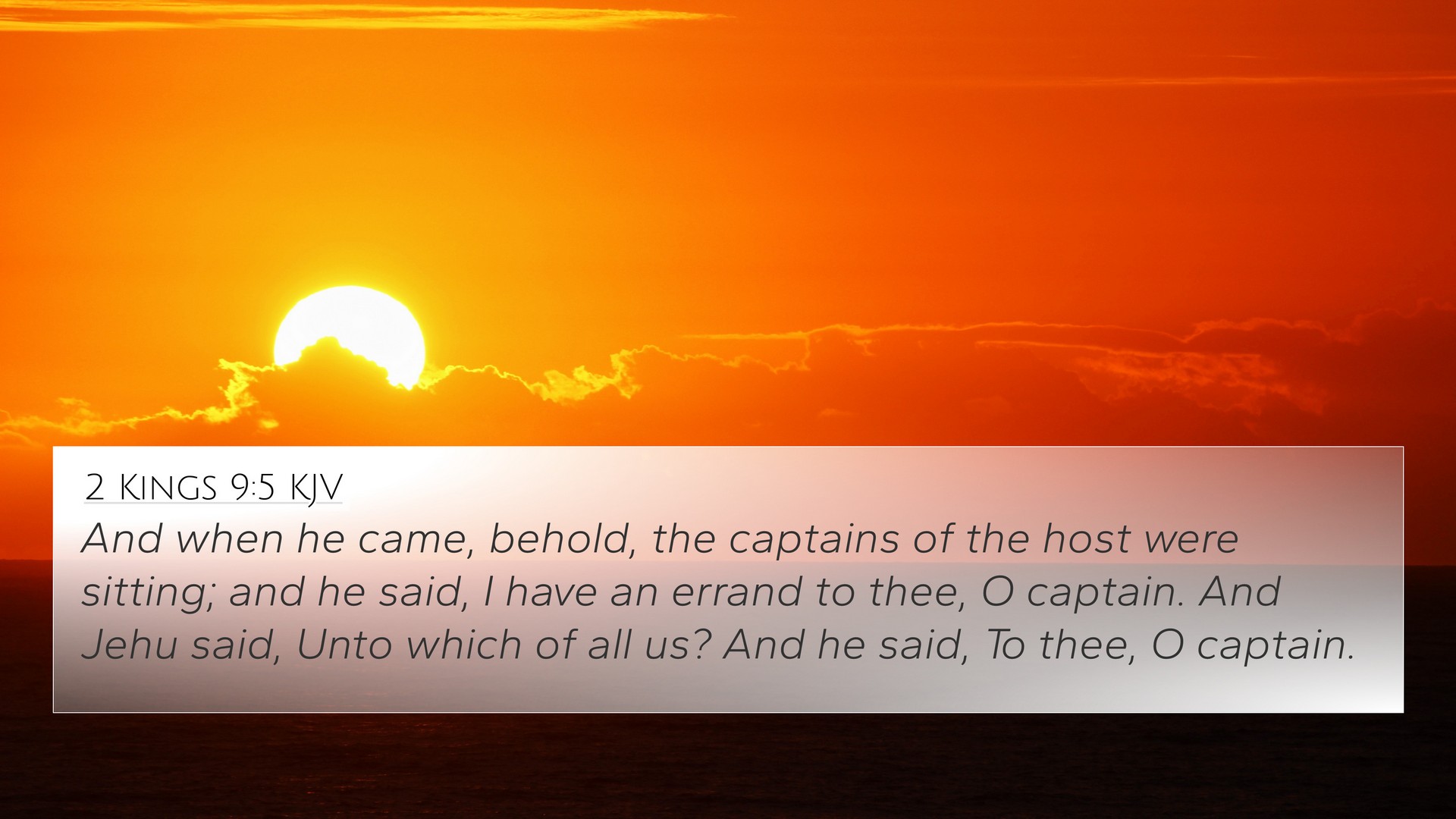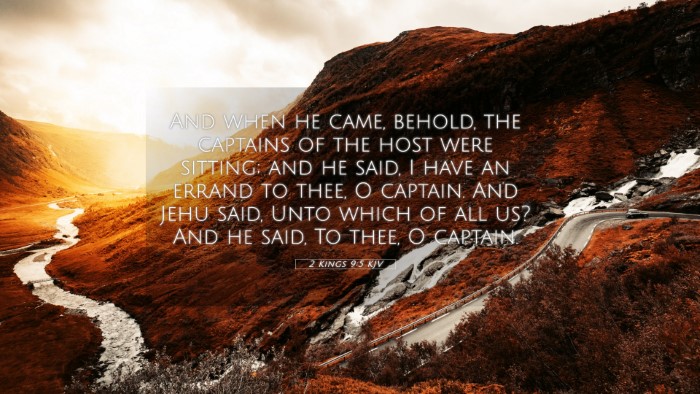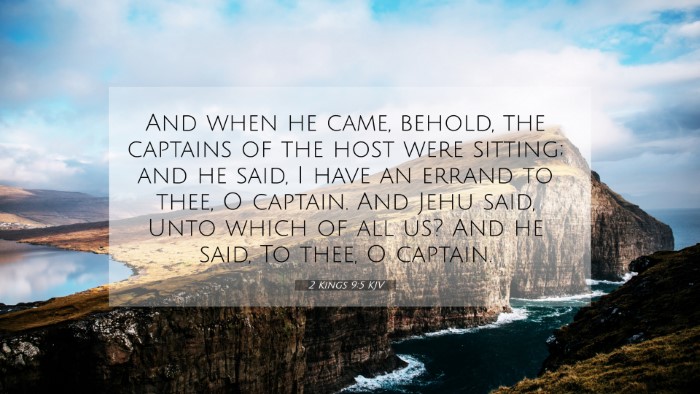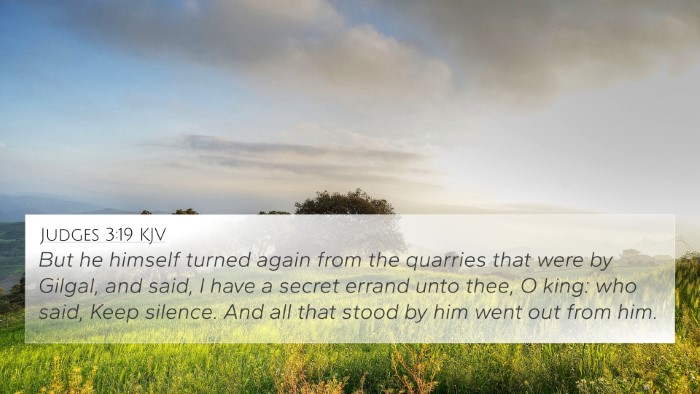Meaning and Interpretation of 2 Kings 9:5
2 Kings 9:5 states: "And when he came, behold, the captains of the host were sitting; and he said, I have an errand to thee, O captain. And Jehu said, Unto which of all us? And he said, To thee, O captain." This verse marks a significant moment in the narrative of Jehu's anointing as king over Israel.
Contextual Understanding
This passage is part of the larger story of the succession of kings in Israel and highlights the divine selection of Jehu to execute judgment against the house of Ahab.
- Divine Appointment: Jehu's dispatch denotes a clear divine appointment, emphasizing God’s sovereignty in the selection of leaders.
- Preparation for Action: The mention of captains signifies readiness for decisive action, implying that Jehu’s leadership would bring about significant changes.
- Urgency of Message: The phrase "I have an errand to thee" indicates the urgency and importance of the task at hand, reflective of God’s commands.
Summary of Key Insights from Commentaries
Combining insights from Matthew Henry, Albert Barnes, and Adam Clarke gives a comprehensive understanding of this verse:
- Matthew Henry: Henry emphasizes the confirmation of Jehu's appointment by the presence of military leaders. It reflects God's orchestration of political changes for His purposes.
- Albert Barnes: Barnes highlights the notion of a direct call from God, underscoring that Jehu was chosen not merely by men but by divine decree—a theme recurrent in biblical leadership narratives.
- Adam Clarke: Clarke notes the significance of the message and the nature of the encounter, illustrating Jehu’s readiness to receive divine revelation and act decisively on it.
Bible Cross-References
To enhance the understanding of 2 Kings 9:5, here are several related Bible verses:
- 1 Kings 19:16: The context of anointing leaders, including Hazael and Elisha, emphasizes God’s providence in leadership.
- 2 Kings 9:1: Jehu's anointing is foretold as a critical turning point, indicating God's plan for Israel's redemption from idolatry.
- 2 Kings 10:30: God's promise to Jehu for his obedience in upholding divine justice reinforces the outcome of his anointed leadership.
- Isaiah 45:1: Discusses the Lord’s anointing of Cyrus, drawing a thematic connection to God appointing leaders to serve His overarching plan.
- Romans 13:1: The recognition of governing authorities as instituted by God complements the divine selection theme found in Kings.
- 1 Samuel 16:12-13: The anointing of David serves as a parallel in recognizing God's choice of rulers.
- Jeremiah 1:5: God’s calling of individuals for specific purposes mirrors Jehu’s appointment as reflecting a chosen mission.
Inter-Biblical Connections
The connections between this Old Testament passage and New Testament teachings form a broader theological understanding:
- Leadership: Jehu's decisive leadership echoes the authority of Christ in the New Testament, who was also anointed to change the hearts of men.
- Judgment: The judgment executed by Jehu parallels the ultimate judgment discussed in the Gospels, reinforcing the idea that God holds leaders accountable for their actions.
- Divine Calling: Both Jehu and figures like Saul and Paul reflect on the theme of being called for significant purposes, which serves as a reminder for modern believers of God's ongoing call to service.
Thematic Connections in Scripture
The themes of divine selection, leadership, and judgment in 2 Kings 9:5 resonate throughout the Scripture:
- God’s Sovereignty: The consistent narrative of God choosing leaders for His people across the Bible showcases His sovereign will.
- Accountability of Leaders: The theme of God holding leaders responsible for their actions exists throughout biblical texts, reinforcing the impact of leadership on the community.
- Preparedness for Action: The call to readiness and action applies universally, urging believers to be attentive to God’s calling in their own lives.
Conclusion
The verse 2 Kings 9:5 serves as a powerful reminder of God's sovereign choice in leadership and the transformational actions that follow. By cross-referencing with related scriptures, we gain a fuller understanding of the role of divine appointment and the expectation of obedience in fulfilling God's purposes. These connections illustrate the continuity of God’s plan across the Old and New Testaments, urging modern believers to recognize their calling and the responsibilities that come with it.



